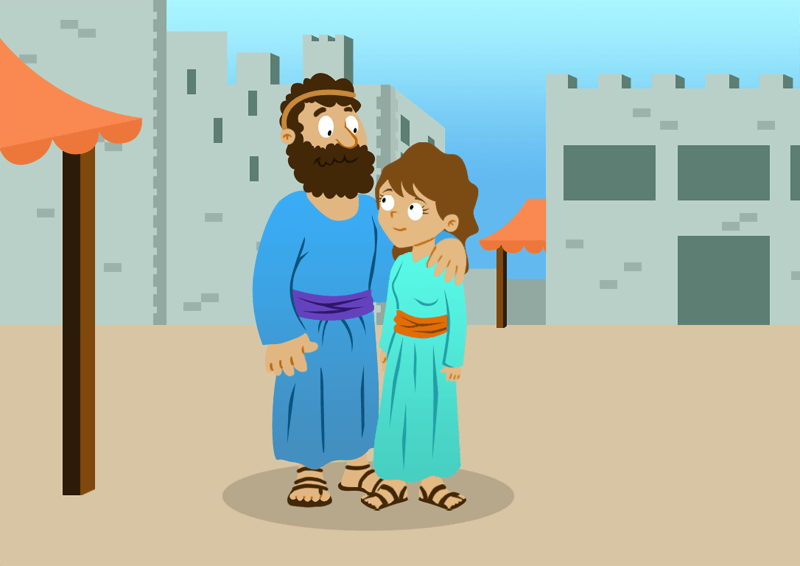Mordecai and Esther: Uttering a Challenge
25 July 2024

When children grow up and move out, it’s not uncommon for parents to watch from the sidelines, not getting in their children’s space, but still being aware of what is going on in their lives and present if needed. The best parent/child relationships allow the parents to be able to navigate this arena in such a way that those adult children always know their parents are there and can be counted on, but the parents refrain from dictating how their adult children should behave or what decisions their adult children should make. Even better than this, however, is when, in these relationships, the adult children have learned they can trust the advice of their parents, but the parents only offer advice when truly necessary or it is asked of them. These relationships don’t magically appear when the children become adults and move out. Instead, they are built up incrementally over the time that the parents and children share the same roof. In families where that trust bond has been established, even when parents believe it is necessary to offer hard advice, it can, in the end, be received well.
This is the case with Mordecai and Esther.
After having lost her parents, Esther was taken in by her cousin Mordecai and raised as his daughter (Esther 2:7). When Esther was presented at the king’s palace as a possible new queen for Xerxes, Mordecai stationed himself close by (Esther 2:8, 11). This served two purposes. It allowed Mordecai to keep watch over his charge while still releasing her, and it allowed Esther to take comfort, while surrounded by people who were not her own, in the fact that she was not alone.
That Mordecai and Esther had a relationship of trust is evident. Mordecai had released Esther to make this move to the palace and compete for the position of queen, yet he stuck around to make sure she was okay and not alone. Esther did not stop heeding Mordecai’s advice and did not reveal “her family background and nationality just as Mordecai had told her to do, for she continued to follow Mordecai’s instructions as she had done when he was bringing her up” (Esther 2:20, NIV). Esther, in a new location and drowning in a waterfall of new experiences, did not abandon her cousin’s teachings or even modify them; she continued to follow his advice.
When word went out regarding Haman’s plot to kill all the Jews, Mordecai went into mourning, exchanging his clothes for sackcloth and ashes (Esther 4:1). Upon discovering that her cousin was in mourning, Queen Esther became distressed and tried to care for Mordecai by sending new garments for him to wear (Esther 4:4). Mordecai refused the fresh change of clothes, so Esther sent one of her attendants, Hathak, to uncover the cause of Mordecai’s trouble (Esther 4:5). Hathak’s request, which came at the behest of his Queen, was met with very detailed information from Mordecai for Hathak to bring back to Esther as well as instructions for Esther to intervene on behalf of her people (Esther 4:6-9).
But Esther was afraid. She knew she couldn’t simply waltz into the presence of the king; she needed to have an invite, or she would be putting her life in danger by stepping into his court. Take careful notice of the fact that Esther’s response to Mordecai, recorded in Esther 4:11, did not say “no” to the task which Mordecai had presented to her. Esther simply reported her very real concern at attempting to intervene. Upon hearing of Esther’s hesitation, Mordecai gave her a “push” to move forward in the challenge which he had already presented to her (Esther 4:12-14).
And how did Esther respond? Standing firm, knowing that she was not alone, she stepped forward into the difficult task that had been handed to her (Esther 4:15-16). She sent word back to Mordecai that she would do as he had asked, but she also asked Mordecai to expand her base of support by calling together all the Jews in Susa in fasting prayer for her success (Esther 4:15-16). What did Mordecai do? He immediately followed the instructions of the one whom he had mentored for so long and who was now ready to undertake a heavy task (Esther 4:17).
When we think of the story of Esther, the most commonly quoted verse is found in Esther 4 and is part of Mordecai’s “push” to Esther:
And who knows but that you have come to your royal position for such a time as this? (Esther 4:14a)
Why do we so commonly quote this? Perhaps it’s because we ourselves often face decisions or actions that are difficult to shoulder but that are right to follow through on, so, placing our trust squarely on God, we plunge ahead. But God built us for community. He does not call for us to go through this life alone, so when we can face these difficult moments arm in arm with someone or several someones who will support us, we can move forward much more boldly. Knowing that we have people on whom we can fall back gives us a certain strength to move ahead.
That’s what Esther had in Mordecai. She was fully dependent on God for the outcome, but knowing she had the support of her mentor and the support of her larger Jewish family gave her a certain boldness. She was not alone!
There are times when God will call us as mentors to utter challenging statements to our mentees. There are times when those statements will call for difficult movement on their part, whether it is something they need to address in their own life, a decision that needs to be made, or a call to step out into where God is calling them and wants to take them to the next level. There will be hesitation on the mentees part that is not a “no” so much as a needing of reassurance that you will not put them out in the cold to deal with whatever it is on their own.
Just like Esther was able to do to Mordecai, sometimes our mentees will be able to initiate expressing what they need from us in the way of support. At other times, we may need to ask how we can support them. It is imperative that, as mentors, we follow through on the commitments of support that we make, so we must also be mindful that we do not commit to something that is too much for us to handle. We can offer alternative ways that we can be there, and we can assist in widening our mentee’s circle if the best support will be found with someone else for this particular circumstance.
We cannot be afraid to utter challenges that God has given us to share with our mentees in the timing that He gives us to share it, but we also must not complete that challenge for them or fail to give them appropriate levels of support while they forge ahead in their personal spiritual growth.
